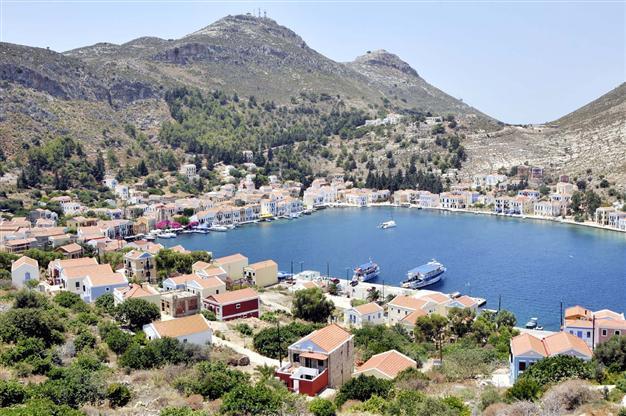Former rivals Greece and Turkey talk business now
Burak BEKDİL ANKARA - Hürriyet Daily News

Turkish arrivals in Greece rose from 161,000 in 2007 to 602,000 in 2012, an increase of 274 percent. The growth continues. In the first months of 2013, 581,000 Turks stepped foot on Greek soil. DHA photo
The most common words in Turkish-Greek affairs like “dogfight, Aegean tensions, rift, crisis, territorial waters and airspace” have lately been replaced with less hostile words: trade, tourism, investment, euros and dollars.Few Turks would know that Greek foreign direct investment in Turkey, despite a most punishing economic crisis that hit the Hellenic lands, has reached $6.5 billion. Fewer may have noticed about 500 Greek companies operate on Turkish soil, mainly in banking, food and beverages, energy, construction and building materials.
In the crisis year 2012, direct Greek capital outflows into Turkey accounted for a stunning 56 percent of all Greek direct investment abroad. That ratio was only one percent in 2008, just four years earlier.
Investment across the Aegean Sea is not reciprocal in numbers. Turkish direct investments in Greece stand at a disproportionate $200 million. There are only 20 Turkish companies operating in Greece, mostly in banking, furniture, marina, textiles and paper industries. The top Turkish investor in Greece is the state-run Ziraat Bankası, with a portfolio of $90 million. Other major investors are Doğuş Holding, Ekol Lojistik, Kartonsan, Istikbal Furtinutre, Beymen, Setur, Trakya Cam, Koton and Iston. Turkish capital flow into Greece in 2012 stood only at 0.05 percent of the total flow into Greece.
Officials and businessmen on both sides of the Aegean are now working day and night to explore new opportunities. In February, the Bureau of Economic and Commercial Affairs of the Greek Embassy in Ankara organized a successful tourism forum in Ankara and lured more than 100 major Turkish and Greek tourist agents, hotel owners and cruise companies.
Tourism very promising
Tourism is one of the most promising sectors. Greek tourist arrivals in Turkey have been largely flat in recent years, fluctuating mostly with the economic performance of the country and Greek individual’s disposable income. But the general trend is upwards: Greek arrivals in Turkey rose from 450,000 in 2007 to nearly 670,000 in 2012, an increase of nearly 49 percent. Arrivals in the nine months to September, however, fell by 11 percent to 363,000 this year from 406,000 in 2012 due mainly to the economic crisis.
But the Turkish tourist interest in the neighboring Greece is impressive. Turkish arrivals in Greece rose from 161,000 in 2007 to 602,000 in 2012, an increase of 274 percent. The growth continues.
In the first months of 2013, 581,000 Turks stepped foot on Greek soil, up from 466,000 in the same period of 2012.
Today, Greek and Turkish tourist businesses have two common goals: to increase tourist flows between Turkey and Greece and to promote joint tourist package tours to attract distant country tourists from China, Japan, India, South Korea and Brazil.
In 2013, the Greek Embassy in Ankara organized the “Business For a” to promote investment opportunities mainly in tourism, renewable energy sources, construction and food and beverages. Ambassador Kyriakos Loukakis and Depty Head of Mission (and Minister Counselor for Economic Affairs) Lambis Kounalakis toured four Turkish cities: Izmir in March, Kayseri in April, Diyarbakir in June and Trabzon in November. These meetings brought together hundreds of businessmen from both sides of the Aegean and produced hundreds of meetings. Future Turkish cities to host Greek business delegations are Gaziantep, Samsun, Bursa, Eskisehir and Adana.
The Greek Embassy is planning trade missions from Turkey’s powerful economic provinces to particular regions in Greece. Meanwhile, an Investment Forum will take place in Ankara Feb. 27, 2014, with particular emphasis on sectors like tourism, real estate, construction, energy and renewable energy sources, food and beverages, agriculture and aquaculture, logistics, export-oriented manufacturing, mining, pharmaceuticals, healthcare and information technologies.
“We believe there is a lot of potential for Greece and Turkey to create more business opportunities and synergies. At any occasion we try to pass on the message to the Turkish local business societies that the crisis in Greece creates business opportunities and Greece is the country that welcomes co-operation with Turkish businessmen. Greece is the nearest gate for Turkey to the EU (markets),” said Kounalakis.
Two-way trade is on the rise but deemed too little, considering substantial Greek investments in Turkey and the size of the Turkish economy, expected to surpass $800 billion this year. Trade volume across the Aegean rose to $3.5 billion in the first 10 months of 2013 compared to $3.038 billion in the same period of 2012.
Businessmen from both countries agree that the most promising sectors to cooperate include agriculture, food and beverages, tourism, construction, building materials and renewable energy sources. They are discussing not only trade, promotion of complementary commodities and joint ventures, but also developing new products that would then be exported to third countries.
Turkish investment in Greece may be low, but in recent years some “big shots” made the headlines in both countries. Turkey’s biggest business conglomerate Koç Holding’s marina management arm, Setur, has acquired the management rights for the Lesvos island marina. And in 2013, the marina subsidiary of Doğuş Group, D-Marin, took over four marinas in Greece.
And most recently, the classical-chic Astir Palace Resort in Vouliagmeni near Athens was sold for 400 million euros to Saudi Arabian fund ACG, which is allied with Doğuş and four other Arab funds. The consortium aims to turn Astir into seven-star hotels and luxury compounds to lure Europe’s jet society.
















